
The Mystery of Language
Language is what makes us human, yet, where is comes from and how it works, nobody knows. Language is the hardest problem in science.
This is my Inspirational Essay for the month of February, which I am opening up for everyone to read. Enjoy and please subscribe. Thank you.
One-time or recurring donations can now be made at Ko-Fi
You can listen to me read this essay here:
A simple word “water” saved a mute, deaf and blind girl named Helen Keller.
Standing at a well and feeling the water flow through her fingers Helen connected the tapping out of the letters with what she felt in her hands. W-a-t-e-r. Anne Sullivan, the governess who was to become “The Miracle Worker” cried tears of joy. On that first day of epiphanies, the little girl learned 30 words.
Helen Keller was born on June 27, 1880, a perfectly normal baby. Two years later, typhoid fever took her sight and her hearing. From that moment on, Helen was confined to a prison devoid of light and sound. She became somewhat of a savage, lashing out at those who tried to connect with her. It was language that freed Helen. By the time of her death on June 1, 1968, Helen had become a prolific writer. She was graduated cum laude from Radcliffe in 1904, and later received honorary Doctor of Humane Letters and Doctor of Law degrees.
Language is what elevates us above other primates. But what is language? How did it evolve? Scientists still puzzle over its evolution. Except that it didn’t evolve, there isn’t any proof that it did. For all appearances—just like the mysterious formation of the universe, just like the illusive spark that brought life into being, language just “happened”.
Researching this topic, I came across what have become the usual phrases scientists use to explain things they don’t understand, like “most scientists think” and “some researchers argue” and “the majority believe” and “we envision” and so on.
It is “generally agreed” (another one of those phrases) that the earliest forms of written language originated from Egypt and China, but again, no one knows how this happened.
Professor Noam Chomsky, one of the leading experts on linguistics, believes it is language that makes us human. “Language, he explains, is a ‘core capacity’ for humans, but ‘where it comes from, how it works; nobody knows’. Scholars Morten H. Christiansen and Simon Kirby even go so far as to label the evolution of languages as: ‘The hardest problem in science’.”
Discover magazine describes three elements of language:
Only humans have direct connections between the neurons controlling our voice box and the motor cortex, the region of our brain responsible for voluntary movements.
Next is our tendency to communicate for the sake of communicating.
The last difference is hierarchical syntax. Phrases and sentences have nested structure, and these provide meaning beyond the simple sequence of words.
Our tendency to communicate for the sake of communicating is what connects us to one another. It is how we build relationships. The biologist Fitch used the German word Mitteilungsbedürfnis, “the drive to share thoughts.” Animals make sounds related to food, sex, danger. Humans yearn to exchange ideas. Those ideas can be about anything and can randomly go in all sorts of directions. Beyond just talking about things, we want our ideas to be understood and appreciated.
Psychologists call this Theory of Mind.
Theory of mind “involves the ability to think about mental states, both your own and those of others. It encompasses the ability to attribute mental states, including emotions, desires, beliefs, and knowledge, and recognize that other people's thoughts and beliefs may differ from yours.”
We have no way of knowing what another person is really thinking—we sometimes have a hard enough time understanding our own thoughts. All we can do is form theories based on how others act and what they do. This interaction of shared ideas, understanding that differences may remain while still being able to appreciate one another, is vital to our survival, and in fact, our advancement, as humans.
Yet, instead of appreciating that we are all unique and acknowledging that we don’t understand how language, or the universe or life even happened, scientists are determined to make every single bit of our bodies and our minds “knowable”. Machines have been given the task to interpret our thoughts for us. Algorithms put us inside the prisons of our own thoughts, recycled, along with others who think similar thoughts. This stunts the unhindered exchange of ideas.
On another front, scientists are determined to steal from each one of us our own profoundly unique Language of God, our human genome. Despite all the advances we have made in neuroscience, our knowledge of how genes determine the growth and structure of brains or how the structure of the brain determines the ability to use language, remains sketchy at best. Scientists believe that if we are ever going to learn more about how human language evolved, the most promising evidence will probably come from the human genome, which preserves so much of our species' history. The challenge was made more than two decades ago to decode it.
In March 2022, scientists announced they had at last completed the first complete, gap-free sequence of a human genome. This, they say, will surely open up new insights into monitoring and improving the physical and mental health of our species.
But still, they were not satisfied.
“An international consortium of scientists has launched a new effort to create a reference genome that captures the genetic diversity of all the peoples of the world. This is called the Human Pangenome Project.”
The long-range goal is to someday enable a person anywhere in the world to go into a doctor's clinic and have a DNA sample collected and sequenced. The patient's individual sequence could then be compared with the reference pangenome to characterize the patient's genotype, providing information about their genetic risk for cardiovascular disease, diabetes and other conditions.
Haven’t they ever heard of the caution: “too much information?”
Africans are naturally wary, having been experimented on by companies like Pfizer when they wanted to test drugs for use in the West, as happened with the unauthorized Trovan testing on children in Nigeria with disastrous results.
According to GEN News:
Most genomic data used for development research is from Europe, the U.K., and North America with African genomic data accounting for less than 3%. Africa remains largely underrepresented in genetic studies despite its role in our evolutionary past, vast population, and genetic diversity. The lack of genomic data limits not only the health care of specific regions and countries in Africa, but also limits the health care and research across the globe.
In the name of “equity”, the Bill & Melinda Gates Foundation, Novartis and the World Bank’s International Finance Corporation have invested heavily in a company called 54gene. Illumina, U.S.-based genetics company is collaborating with 54gene—whose mission is to advance precision medicine capabilities in Africa through research, advanced molecular diagnostics, and clinical programs—to create a genomics facility in Lagos, Nigeria.
Illumina was one of Times 100 most influential companies in 2021. So the story goes, it was the Illumina lab in China that “outed the virus behind COVID-19, posting its entire genome so researchers around the world could use it to develop new drugs and vaccines.”
…scientists at Massachusetts-based biotech Moderna, also relying on Illumina equipment, developed a vaccine to fight the virus in record time—25 days—and were ready to test the shot in people in 63 days, another speed record. BioNTech in Germany wasn’t far behind after partnering with U.S. pharmaceutical company Pfizer. Time
Talk about communication. Isn’t it great how they all worked together, ushering in the “Golden Age of Vaccines” that I talk about in my last essay.
Abasi Ene-Obong, chief executive of 54gene and 2019 Quartz Africa Innovator honoree, is determined that his company will study diverse African DNA samples to find “naturally occurring mutations” which can then be modeled as drugs to treat both Africans and non-Africans. Ene-Obong wants any drugs developed based on its genome samples to be trialed and available in Africa first.
I wonder how much money Ene-Obong was paid to offer up his people of Nigeria as guinea pigs once again for the pharmaceutical industry.
So, what happens when all of this DNA is out there to be easily read and interpreted? This fluffy idea that people will waltz into a doctor’s office to find out their genetic risk of diseases is ludicrous. All sorts of abominable things can happen when this information that was once private is out there in the open for heartless machines to read.
I would imagine that, just like there became a black market for vaccine cards during Covid, there will be a black market for faking people’s weaknesses for certain illnesses. Just on Telegram alone, the number of followers of groups offering vaccination credentials has soared 566% since early 2021. The number of fake vaccination card vendors on Telegram and WhatsApp jumped 257%. Over 2,500 Telegram groups sold fake vaccine cards with some group members approaching half a million.
The black market will expand to serve the needs of people predisposed to diabetes, for example, who could be forced to take medications and penalized if they don’t. For those at high risk of certain diseases sterilization could be required. After all, if the scientists can map out those who are weak and those who are strong, surely at some point they will justify killing off the weak ones for the good of furthering the species.
Overcoming adversity will become a thing of the past. Like a child with asthma becoming a world-class athlete. Or someone like Stephen Hawking even being allowed to live beyond birth. Perhaps if they determined someone like him had a brilliant mind, they could extract the brain, grow it in a dish and then offer it up to artificial intelligence on a silver platter, while using any of the organs, blood or whatever else of the body for experiments or to replace failing organs of the elite.
Scientists now talk of predicting those who are susceptible to mental health conditions. One day, genetic research may make it possible to provide a more complete picture of a person’s risk of succumbing to a particular mental disorder or drug addiction, schizophrenia, bipolar disorder, you name it, based on his or her genomes.
This leads us to Epigenetics, “the study of how your behaviors and environment can cause changes that affect the way your genes work. Unlike genetic changes, epigenetic changes are reversible and do not change your DNA sequence, but they can change how your body reads a DNA sequence.”
If your body isn’t “reading DNA sequencing” properly, can your behavior be blamed for this? If so, control of your behavior will be justified. It won’t be your fault you need an outside force to control you. It has nothing to do with your free will or your ability to make choices. There are no choices. There are no debates. No need to bounce ideas off each other because there will be nothing for your little pea brain to figure out. The algorithms will figure it out in seconds.
Until now, language has always been about communication with words between two or more human beings. People speak roughly 7,000 languages worldwide. Although there is a lot in common among languages, each one is unique, both in structure and in the way it reflects the culture of the people who speak it. Reading an English translation of Dostoevsky is not the same as reading it in Russian, not matter how good the translator may be. Sadly, I will never know that experience. All of our experiences are unique to each of us and languages are every bit as unique as the people who speak them.
We can look forward to a near future when our mental and physical health, our bodily functions, even our thoughts, will no longer be our private business. In the old days, if your body noticeably got fatter, people around you would rightly deduce you had gained weight. If you were sad about it, you might talk to your friends, or a therapist, you might even take action by changing your eating habits and going to the gym. Or you might sit around, eat fast food and ice cream and get fatter. All of these things were up to you and your free will. There was no one reading and interpreting your vital signs, mapping out your genetic code, predicting your propensity to get fat, predicting subsequent depression and forcing medications on you.
The word “fat” is a loaded gun. Words go in and out of fashion and it isn’t the word itself that is as important as the emotion attached to it. Language is fluid and that’s just one more aspect that makes it “alive”.
If you want to get a good laugh about words and how we interpret them, watch this foreign comedian talking about the word “ass”.
He says “ass” is the hardest word in the English language to truly master:
“I thought it’s really easy, it means a butt. But no. Like, yes, sometimes it means a butt, but “lazy-ass” means lazy, like “my lazy-ass husband” is the same as lazy. “Long-ass” means “long” like a “long flight”, but if you want to make it longer you add “ass”. My favorite one a “grown-ass man”. Turns out it means a grown man, the entire man has grown, not only the ass.”
Then there’s “bad-ass”—that’s good, but not always. Dumb ass still means dumb. “Smart-ass” is someone who isn’t actually smart. If you say, “this car is really fast” and I say, “Oh, fast, my ass,” that means, no it’s not so fast.
To complicate it even more, “ass” can be divided. If you are an “ass,” you are being stupid, but if you are doing something “half-assed,” you are not giving it your all. And if you go even smaller, if you are a “piece of ass,” then you are beautiful.
It can be really complicated!
As a child, I attended the village school in Echandens, Switzerland. A few years ago, as I’ve mentioned in other essays, I returned with my daughter and my niece to visit the village. We walked along the same route from the castle where my family lived to the school on the other side of the village. There I discovered that the maintenance man (the fellow below) had been in my class!
I had hated attending that school. My two brothers and my sister hated it, too. We begged for our parents to let us stop, but they refused, saying it was good for us.
I didn’t have as hard a time as Helen Keller did, but I struggled with the language. The year was 1966, and an American kid had never set foot in that school before. It was as if I was an alien from another planet. When I attempted to speak, the French kids laughed as if I was the funniest thing in the world. Not being able to communicate made for many misunderstandings.
My teacher, Madame Petriquan (not sure how to spell it) looked like every wicked witch from Disney rolled into one. She had scraggly grey hair pulled back into a bun, horribly yellow teeth, a mole on her nose and hairs on her chin. She spoke French with a guttural accent and spit when she talked. It was very unpleasant standing next to her, but I was so terrified of her that I didn’t dare move away from the line of fire when she was pointing out how to pronounce words to me.
Corporal punishment was a thing and the two boys who most often misbehaved were regularly kicked by her or had their ears twisted as they were led to the corner where they would have to stand facing the wall. This would be considered abuse in our schools back home, but the boys endured their punishments with glee, nothing ever seemed to phase them. I was in awe. My sister and I called the two most mischievous ones Tom Sawyer and Huck Finn.
I still have “Mon Premiere Livre” and my workbook. You can see from the photos how meticulously I had to write. This is a lost art. Kids don’t write anymore. Nor do they read. They don’t have the attention span to do it.
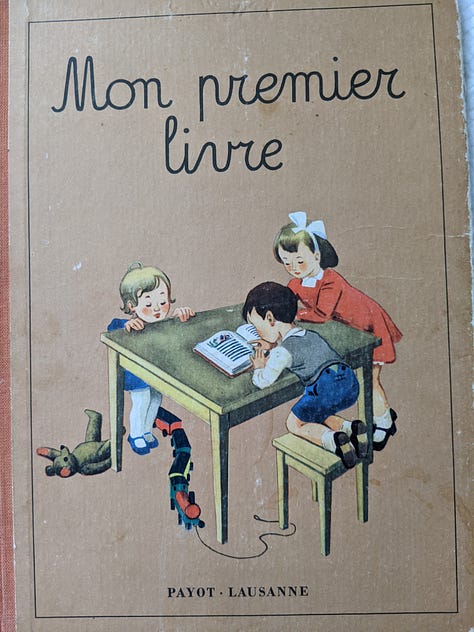

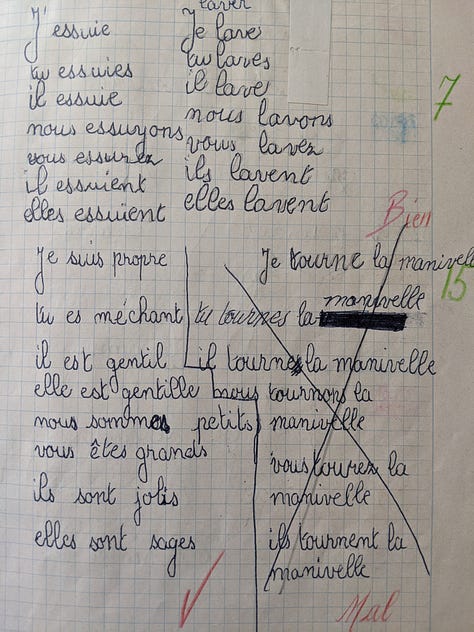
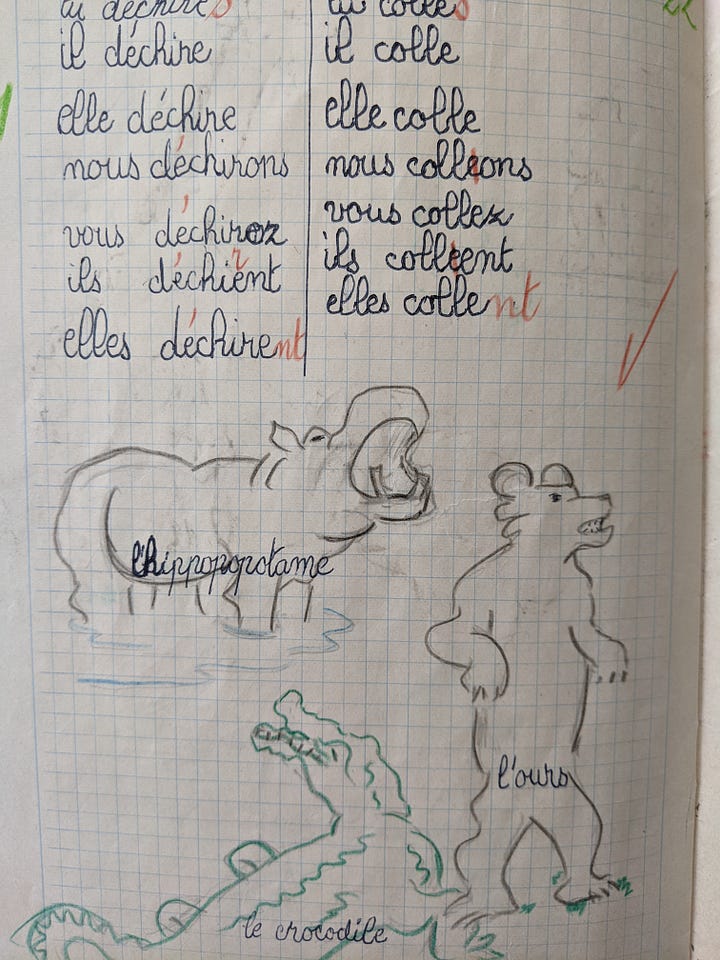
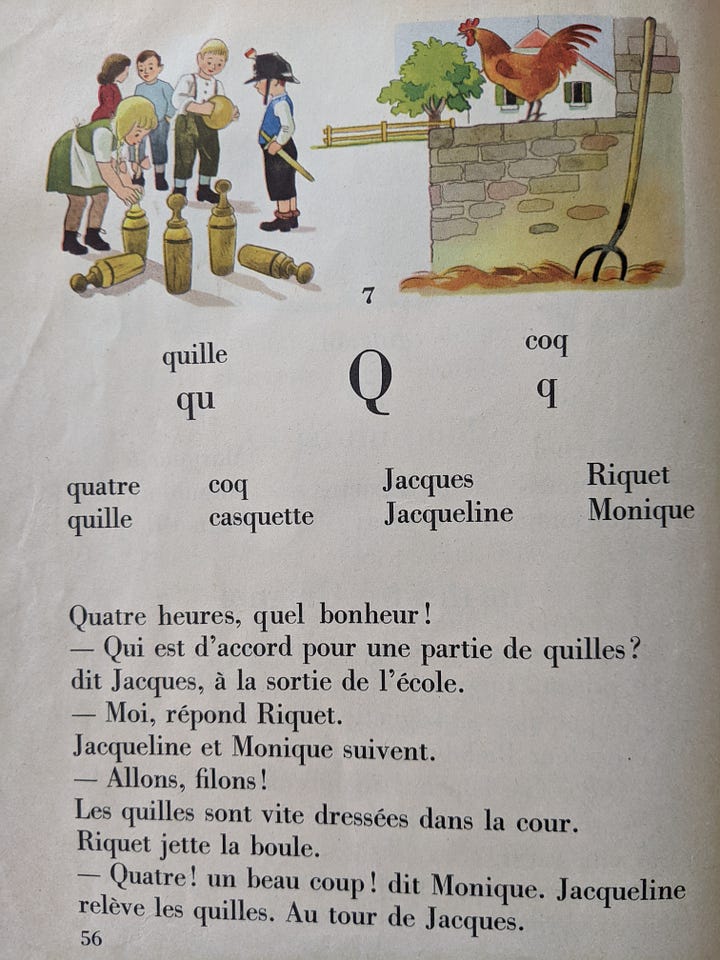
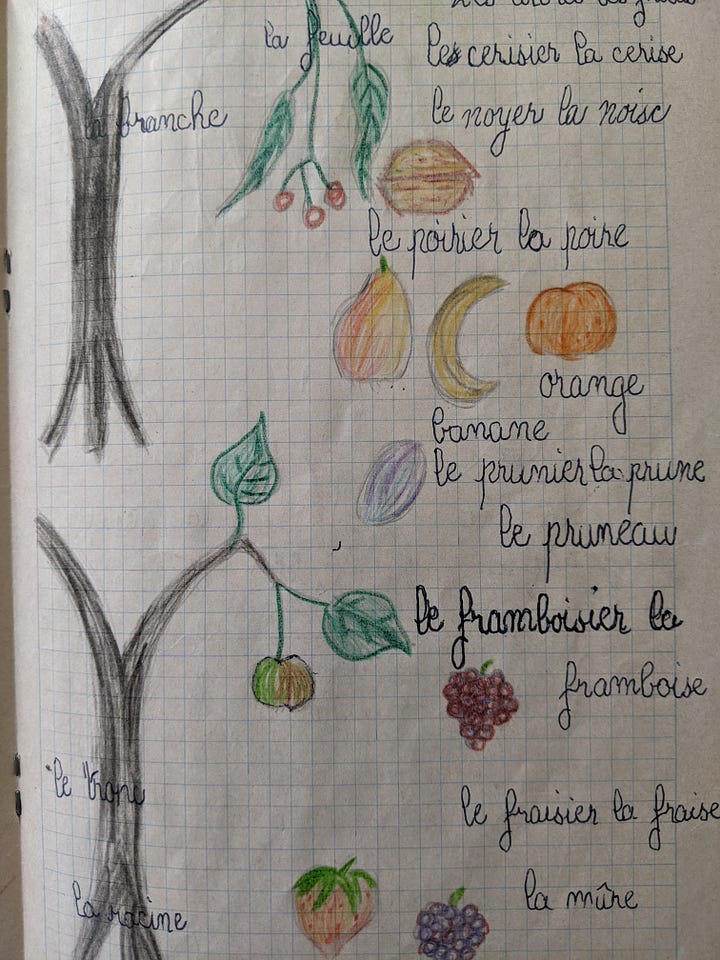
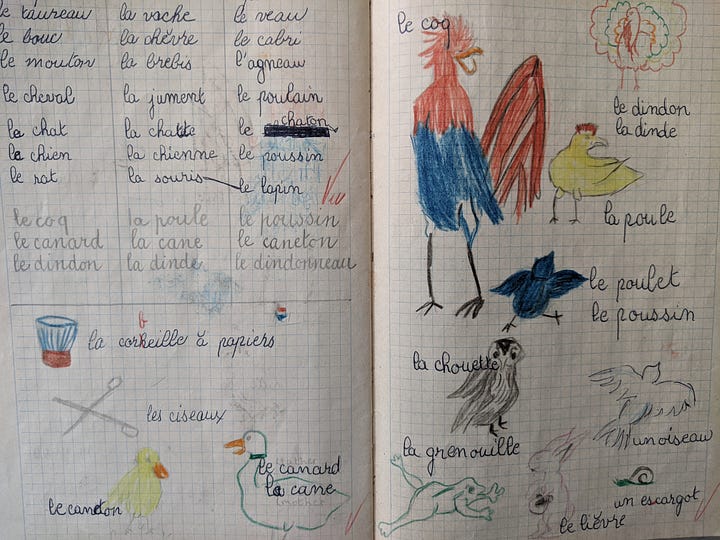
We are being told that ChatGPT and its rivals, like Bard at Google (they are still working on it), will revolutionize school and learning.
Revolutionize? Rather, destroy children’s inquiring minds so that they never speak out or revolt against anything. Any child suggesting an exploration of “misinformation” will be chided heavily by AI and steered back to acceptable points of view.
Mira Murati — chief technology officer at OpenAI says, "With tools like ChatGPT, you can endlessly converse with a model to understand a concept in a way that is catered to your level of understanding. It has immense potential to help us with personalized education."
“Endlessly converse with a model” instead of debating with another human being. The model can only come to one conclusion. Conversations with other humans can be unpredictable and exciting.
I’m hearing the word “personalized” too much lately. Your health will be personalized. You education will be personalized. You will be categorized, and you will have to stay in that box.
Although as a child, I hated going to that village school, I’m glad my parents insisted. Once I started learning more words, I began to realize that the kids weren’t all monsters. And they must have realized we weren’t either. We just hadn’t understood each other.
That’s what we humans yearn for and what I pray we do not lose. The desire to understand and to be understood by others. If we lose this, we lose a large part of what it means to be human.
Endlessly converse with a model, you say. Model, my ass.




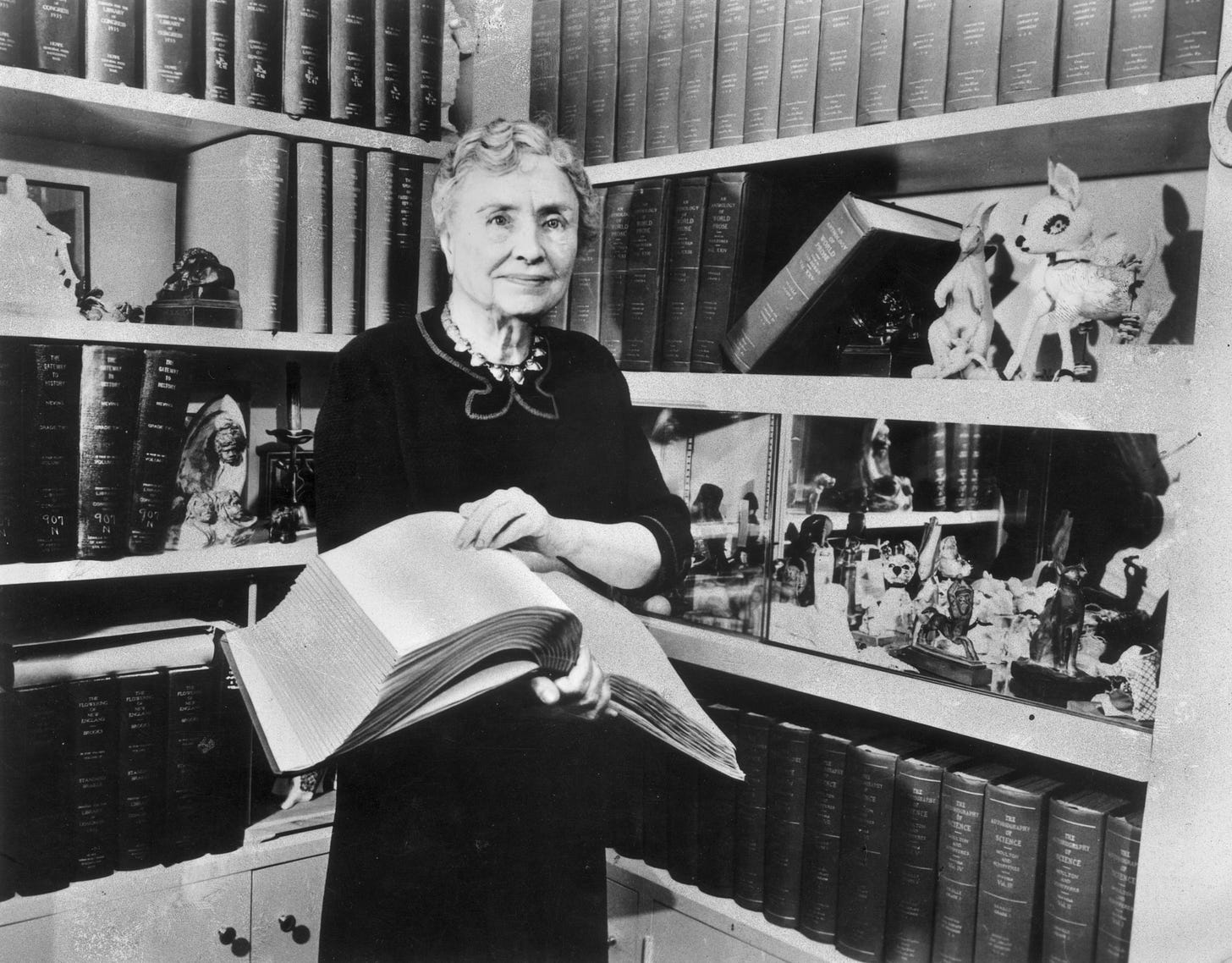
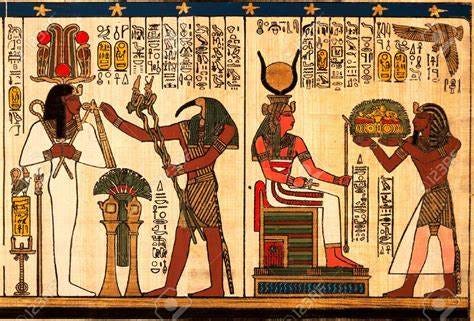
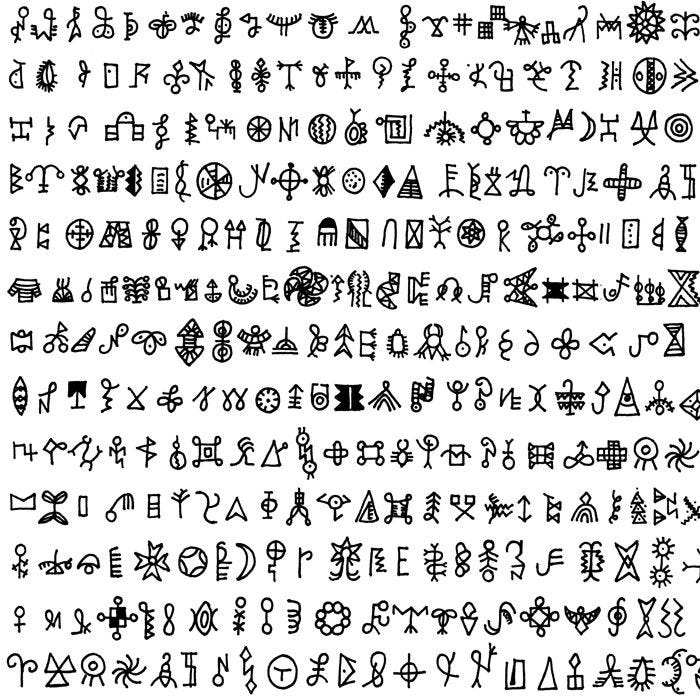
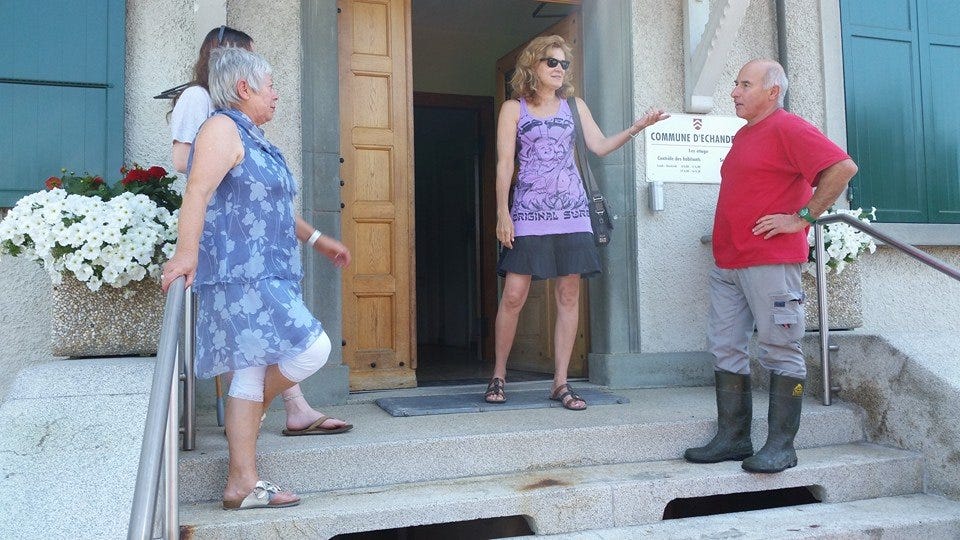









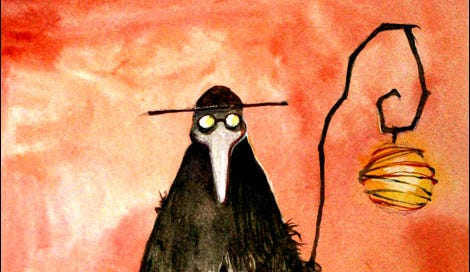

"Language is what makes us human"... doesn't look it has accomplished a Great Thing!
In reality since language is a byproduct of Thought I can only declare that nothing Balanced comes out of language.
If it did I would expect that uman animals wouldn't be living and acting the way they have been for Millennia.
So... I must ask that the author defines what is a "human"?
An outstanding essay! Your insight about reading Dostoyevsky in the original is very astute. It's even truer regarding poetry, which is utterly untranslatable. It's worth learning Russian just to be able to read Pushkin in the original.